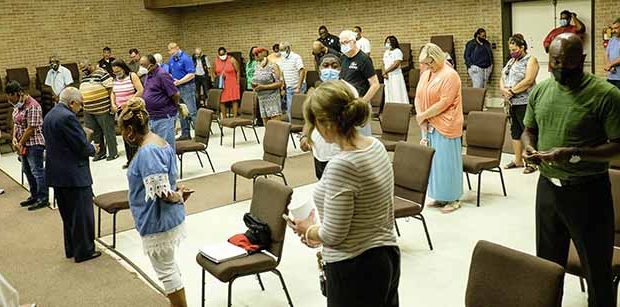Dialogue, but no plan yet, for bridging racial divide

By DON FLETCHER
News Staff Writer
The public meeting held last Thursday, June 18, at Atmore City Hall Auditorium was the second in a proposed series of sessions designed to provide dialogue that could ultimately help devise a plan to bridge the gap between residents of different races. There was plenty of dialogue, but no plan has been yet formulated.
Eleven people, all but one of them African American, spoke for three minutes each, most commenting on or complaining about the way city police handle arrests and traffic stops in the city’s northeastern sector.
Pastor Darryl North of Empowerment Tabernacle led things off, stating that change is needed, but that both sides have to be willing to listen to the other.
“I love the city of Atmore,” North said. “Of course, all of us can say that there needs to be change, which is positive change. I have found out that if you want understanding, you’ve got to be able to understand; if you want respect, you’ve got to give respect.”
After a prayer was delivered to officially open the meeting, and Carolyn Morris and Blanche Cunningham led the assemblage of about 50 people in the singing of Vince Gill’s “Let There Be Peace on Earth,” the dialogue began.
Shree King, who organized the recent local protest march, was the first to speak, relaying questions from people who could not attend or who did not wish to speak themselves.
“What is the percentage of police patrols in the north and south parts of the city?” she asked. “The number seems disproportionate toward the north side. Why are there more patrols on the opposite side of the tracks than across the tracks?”
Police Chief Chuck Brooks said the input he has received from residents of the city’s northern section is that there isn’t a strong enough police presence in the area.
“Actually, I get more complaints that there are not enough patrols in all the zones, not any particular zone” Brooks said, explaining that the city is divided into five patrol zones.
King also asked how Brooks and APD were “engaging with the community to develop trust,” to which the chief answered that officers go to local schools and read to the children.
After being asked if the police chief planned to implement change in the procedures city police use during traffic stops, arrests and other interactions with the public, Brooks said he and his department would continue to enforce the law and work toward maintaining the safety of the public.
“Police officers are human, but they have been spit on, cussed at, slapped,” he said. “I cannot let chaos and anarchy invade our city; I will not do it. I am going to police this town as professionally as I can and be good to everybody.”
Russell Robinson brought up the possibility of a citizens’ advisory board being formed to bring complaints and concerns from the public to police and city officials. Brooks said he had no problem with that, if such a committee could remain intact.
“That’s all fine and good,” he said. “But people move in, then they leave. It’s like everything else — you implement something, then a day turns into a week, a week turns into a month, then (the committee) gets dissolved. I don’t mind an advisory committee, but I’d like to look into some other cities our size that have done that, do some research on it.”
Destiny Worship Center Pastor Bernard Bishop later commented that police must work to restore a positive relationship with citizens.
“It’s true that people cannot fix what they don’t know,” he said. “But people cannot share information with people they cannot trust. I believe an advisory board needs to be at least considered.”
The dialogue continued, with most of the questions being directed toward city police.
Near the end of the meeting, Escambia County Sheriff Heath Jackson spoke. Jackson talked about the crisis that has evolved from the Memorial Day killing by police of a Minneapolis man, George Floyd, and reminded the gathering that only by working together could racial harmony be achieved.
“One bad apple doesn’t define us all,” he said of law enforcement officers. “We’re here to support the community; we’re here to stand side-by-side with anybody who wants to fight the fight. But ‘team’ is the word that everybody is skipping. What I like is somebody that steps in and says, ‘there’s a problem, what can we do to fix it?’ Then, let’s get after it.”
Shree King took her second turn in front of the crowd, calling for a stop to the practice of teaching children to hate or be suspicious of other children who are not of the same race.
“There is no right or wrong way to say nothing,” she said. “The only wrong way is to keep your mouth closed. There was some good points made tonight. This is the beginning, not the end, of anything we’re trying to do.”
She noted that young people represent the future of the community and said the clergy and city officials should be held accountable for helping heal the wounds that have developed within the community.
“We’ve got to stop teaching our kids hate,” she said. “We have to teach them how to love. Atmore is too small to have so much hate, too much hate. It’s not going to stop, but it has to be under control. That starts with our leaders.”
After Mayor Jim staff thanked those who stepped forth to ask questions and express concerns during the hour-long session, North summed things up in a simple manner.
“We’re sitting here talking, but we have to have a plan,” he said.
